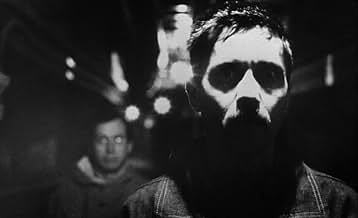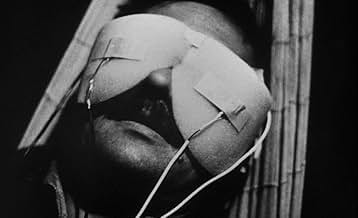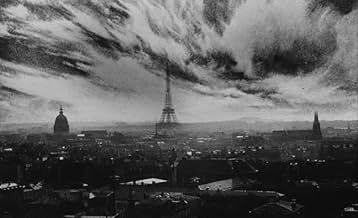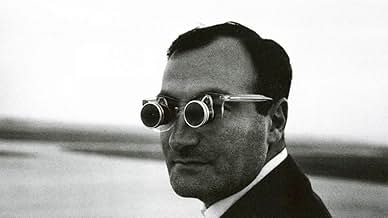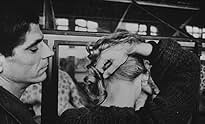AVALIAÇÃO DA IMDb
8,2/10
39 mil
SUA AVALIAÇÃO
A história de um homem forçado a explorar suas memórias após a devastação da Terceira Guerra Mundial, contada por meio de imagens estáticas.A história de um homem forçado a explorar suas memórias após a devastação da Terceira Guerra Mundial, contada por meio de imagens estáticas.A história de um homem forçado a explorar suas memórias após a devastação da Terceira Guerra Mundial, contada por meio de imagens estáticas.
- Prêmios
- 2 vitórias no total
Jean Négroni
- Narrator
- (narração)
- (as Jean Negroni)
Ligia Branice
- A woman from the future
- (as Ligia Borowcyk)
William Klein
- A man from the future
- (as Bill Klein)
James Kirk
- Narrator
- (English version)
- (narração)
Avaliações em destaque
In 1995, Terry Gilliam made one of the finest movies in the nineties: "Twelve Monkeys". To explain how he made this awesome movie, he openly declared that he drew his inspiration from a French short film: "La Jetée". It is true that the 2 opus have similarities: both present a devastated earth caused by man's madness, survivors who take refuge in underground rooms and try to improve their grueling living conditions and especially both feature a jaded and manipulated main character.
A short film that is a reflection about time, happiness and love, entirely composed of static shots, "la jetée" is a powerful and mesmerizing work and it may appear as a cornerstone in French cinema. 42 years after its release, it kept all its strength and has not aged a bit. The quality of the editing, the photography and the commentary add to the success of Chris Marker's work.
Highly recommended and the influence of Chris Marker's short film on "Twelve Monkeys" shows well a thing: French cinema inspired a great number of American movies.
A short film that is a reflection about time, happiness and love, entirely composed of static shots, "la jetée" is a powerful and mesmerizing work and it may appear as a cornerstone in French cinema. 42 years after its release, it kept all its strength and has not aged a bit. The quality of the editing, the photography and the commentary add to the success of Chris Marker's work.
Highly recommended and the influence of Chris Marker's short film on "Twelve Monkeys" shows well a thing: French cinema inspired a great number of American movies.
I had never seen such an original film that works so well. The artist with no budget decides to make a film that could have appealed to the commercial masses. That is what is scary about it. It's the kind of story that we would consider "blockbuster gold". A journey through time, sci-fi, and romance. And yet, it requires no special effects, it requires no big budget. Marker laughs right at the face of conventional cinema and uses stills to let out imagination read between the lines.
Is this fiction? Yes, to some extent. The post-apocalyptic story that it recounts would make Waterworld blush with embarrassment, true. But once again, the arty film looks at us to find a meaning for the story. At the end of the day, are we more taken aback by the technical aspect in which Marker engages, or by the shocking finale. Would the finale have been so shocking had Marker used a Bolex camera? I fear not. The bit where he's running towards the girl in the end feels like an average nightmare, where you're running, but you can't get to wherever you want to get to. It's a feeling we have all felt, and the lack of movement within the frame conveys a certain feeling of helplessness and entrapment that could only have been achieved this well with stills.
And we must say, these stills are amazing. It's not only the elaborate mise-en-scene, or the design of the sets and the props (the french sci-fi glasses are extraordinary). It's also the placement of the camera, that has a ghostly versatility that often adds to the lack of comfort of the restless characters.
I must also give a shout for the score that is amazing, which is strange if we count that your average experimental film hardly ever employs such "cinematic" scores, always going for the more minimalist (and generally less expansive) ones.
Is this fiction? Yes, to some extent. The post-apocalyptic story that it recounts would make Waterworld blush with embarrassment, true. But once again, the arty film looks at us to find a meaning for the story. At the end of the day, are we more taken aback by the technical aspect in which Marker engages, or by the shocking finale. Would the finale have been so shocking had Marker used a Bolex camera? I fear not. The bit where he's running towards the girl in the end feels like an average nightmare, where you're running, but you can't get to wherever you want to get to. It's a feeling we have all felt, and the lack of movement within the frame conveys a certain feeling of helplessness and entrapment that could only have been achieved this well with stills.
And we must say, these stills are amazing. It's not only the elaborate mise-en-scene, or the design of the sets and the props (the french sci-fi glasses are extraordinary). It's also the placement of the camera, that has a ghostly versatility that often adds to the lack of comfort of the restless characters.
I must also give a shout for the score that is amazing, which is strange if we count that your average experimental film hardly ever employs such "cinematic" scores, always going for the more minimalist (and generally less expansive) ones.
I note that most of the comments I've seen have been written by people who saw 12 Monkeys first and then chose somehow to see La Jetee.
Comparisons are useless beyond the basic feel of the story.
When I first saw 12 Monkeys I didn't know its relationship to La Jetee, a film I had not seen in 25 years. Yet, I recognized this relationship almost immediately, even though I could not remember the name of the movie. This I realized through the feel of the story ... down to the very end.
In many ways the short film was much more stimulating ... even though I had forgotten the name of the film I had never forgotten the images or the impressions it made upon me. I guess that's strange, but as I recall I saw it at Rice University as a part of a film festival back in the 60s.
Granted, films must sustain themselves somewhat through the years to maintain their value as true art, but one must always remember the context of the film's original audience.
I wonder now if the dependence on stills to portray the story had any influence on Ken Burns? Heh ... he's made a reputation on the same technique.
My point ... accept both movies on their own merits.
Comparisons are useless beyond the basic feel of the story.
When I first saw 12 Monkeys I didn't know its relationship to La Jetee, a film I had not seen in 25 years. Yet, I recognized this relationship almost immediately, even though I could not remember the name of the movie. This I realized through the feel of the story ... down to the very end.
In many ways the short film was much more stimulating ... even though I had forgotten the name of the film I had never forgotten the images or the impressions it made upon me. I guess that's strange, but as I recall I saw it at Rice University as a part of a film festival back in the 60s.
Granted, films must sustain themselves somewhat through the years to maintain their value as true art, but one must always remember the context of the film's original audience.
I wonder now if the dependence on stills to portray the story had any influence on Ken Burns? Heh ... he's made a reputation on the same technique.
My point ... accept both movies on their own merits.
This is one of the most stunning short films ever made. Marker has pieced together an oblique, sci-fi setting for marvelous still photography; when there is movement, it is a cause for joy! Everyone who is a cineast should see this film: it's that good and it's that important!
La Jettée (1962) is not only the most important work of science-fiction cinema since Fritz Lang's masterwork Metropolis (1927), but is also one of the most staggering achievements in the entire history of film. Here, filmmaker Chris Marker presents the audience with the ultimate cinematic dystopia; a futuristic, industrialised landscape of underground tunnels, colourless streets and jarring 60's architecture. The results are beautiful yet somewhat anachronistic, as the filmmaker employs a similar approach to that of Godard in Alphaville (1965) - or more recently, Winterbottom's Code 46 (2003) - albeit, with a less straightforward attitude to plot and ideology.
The basic narrative outline of the film is built around various reflective layers - similar to what Tarkovsky would use in his later film, Mirror (1975) - which allow Marker to create a certain feeling of mirroring between the notions of fact and fiction, life and death, reality and fantasy and so on. This, in turn, further develops the characters and the world of which they inhabit. The reason the film works without becoming a cold, lifeless lecture is because it anchors the images of nuclear holocaust and scientific exploration within humanistic characters and a sense of unashamed romanticism. But this is only one part of an elaborate puzzle; lest we forget that we are dealing with certain narrative paradoxes, not to mention an assortment of linear and non-linear story elements each unfolding simultaneously. Just when we think we've got the whole film worked out, our perspectives immediately change, and our ideas are lost in the blink of an eye.
However, aside from thematic visual palindromes, what is most remarkable about La Jettée - and the reason it has retained its reputation as a work of genius - is the way in which Marker manages to relate his story of travel and movement through the use of still images. By presenting these pictures to us in a sort of photo-montage - complete with brooding voice-over and various sound effects - the director somehow manages to bring the stillness of his film miraculously to life. It is, without question, a work of pure, unadulterated imagination, and a staggering testament to Marker's genius ability to convey a multitude of feelings, ideas and emotions, through a series of simple, static, though nonetheless, deeply evocative images.
The basic narrative outline of the film is built around various reflective layers - similar to what Tarkovsky would use in his later film, Mirror (1975) - which allow Marker to create a certain feeling of mirroring between the notions of fact and fiction, life and death, reality and fantasy and so on. This, in turn, further develops the characters and the world of which they inhabit. The reason the film works without becoming a cold, lifeless lecture is because it anchors the images of nuclear holocaust and scientific exploration within humanistic characters and a sense of unashamed romanticism. But this is only one part of an elaborate puzzle; lest we forget that we are dealing with certain narrative paradoxes, not to mention an assortment of linear and non-linear story elements each unfolding simultaneously. Just when we think we've got the whole film worked out, our perspectives immediately change, and our ideas are lost in the blink of an eye.
However, aside from thematic visual palindromes, what is most remarkable about La Jettée - and the reason it has retained its reputation as a work of genius - is the way in which Marker manages to relate his story of travel and movement through the use of still images. By presenting these pictures to us in a sort of photo-montage - complete with brooding voice-over and various sound effects - the director somehow manages to bring the stillness of his film miraculously to life. It is, without question, a work of pure, unadulterated imagination, and a staggering testament to Marker's genius ability to convey a multitude of feelings, ideas and emotions, through a series of simple, static, though nonetheless, deeply evocative images.
Você sabia?
- CuriosidadesThis short film was the inspiration for the Terry Gilliam film Os 12 Macacos (1995).
- Cenas durante ou pós-créditosThe opening credits do not describe it as a film, but as "un photo-roman".
- ConexõesEdited into The Hamster Factor and Other Tales of Twelve Monkeys (1996)
Principais escolhas
Faça login para avaliar e ver a lista de recomendações personalizadas
Detalhes
- Tempo de duração
- 28 min
- Cor
- Mixagem de som
- Proporção
- 1.66 : 1
Contribua para esta página
Sugerir uma alteração ou adicionar conteúdo ausente

